
Film promotion strategies have undergone significant changes over time in the constantly changing world of Bollywood. In the early 2000s, the romantic drama "Rehna Hai Tumhare Dil Mein" underwent a promotional campaign that was both novel and innovative. Vashu Bhagnani, the film's producer, introduced a novel idea by releasing a second set of audio cassettes that included four additional film title tracks. Not just the addition of new songs, but also the creative way in which the television audience was engaged in selecting one of these songs to be featured in the movie, set this strategy apart. The success of the film is discussed in depth in this article along with the specifics of this memorable promotional campaign.
2001 saw the release of the romantic drama "Rehna Hai Tumhare Dil Mein," which was directed by Gautham Menon. Madhavan and Diya Mirza played the main characters in the movie, which became popular among young people right away. Producer Vashu Bhagnani made the decision to try out a novel marketing tactic that was based on the soundtrack of the movie as part of its promotional campaign.
A second set of audio cassettes for the movie's soundtrack were added by the producer in this creative move, in addition to the first set. With the exciting opportunity for the television audience to choose which of these four title tracks would be included in the movie's final soundtrack, this second set of title tracks contained four of them.
Vashu Bhagnani and his team started a contest to engage the television audience, which not only captured their attention but also generated buzz for the movie. One of the four new title tracks could be chosen by viewers to be featured in "Rehna Hai Tumhare Dil Mein" through the contest. The audience was encouraged to take part by making predictions about which of the four songs would be played and sending those predictions in with their entries.
The contest's sponsors added enticing rewards to those who correctly predicted the title track that would be played in the movie in order to make it even more compelling. Cash and exciting goods were among the available prizes. As a result, there was more interest in the contest and an atmosphere of anticipation and excitement among the audience.
The competition for audio cassettes quickly became extremely popular. Not only did it get people talking about the movie, but it also greatly increased interest in the four new title songs. The movie received a lot of media attention as people anxiously awaited the final decision on the selected song.
It was more than just a passive viewing experience because the television audience's input in the selection process gave them a sense of ownership and connection to the movie. The viewership had a stake in the outcome, which aided in creating a solid connection between the movie and its audience.
Following the tallying of the votes and the announcement of the audience's choice, Bombay Jayashri's lyrical song "Zara Zara" was declared the winner. This soulful, sultry song was a natural fit for the movie's plot and perfectly complemented it.
The song "Zara Zara" was incorporated into the movie, which gave the story a new depth and level of emotion. It quickly became a chart-topper. The choice of song was made by the audience, which proved to be a wise choice because it resonated with the youth, who related to the lyrics and melody because they related to their own feelings and experiences.
Intriguingly, the other three songs from the second cassette—"Sach Keh Raha Hai," "Dil Ko Tumse Pyar Hua," and "Dilnasheen"—also made an appearance in the movie, despite "Zara Zara" being the title track. The producers had to include all four songs because of "Rehna Hai Tumhare Dil Mein's" enormous youth appeal, which forced them to do so and ensured that the soundtrack would play a major role in the film's appeal.
In Bollywood's promotional history, the audio cassette competition for "Rehna Hai Tumhare Dil Mein" left a lasting impression. It proved that creative and interactive marketing techniques could hold an audience's interest and spark a lot of excitement about a movie. This marketing strategy also emphasised the importance of music in popularising a film.
The success of the competition inspired other producers and directors to look for innovative ways to engage audiences and market their films. Bollywood started to see a shift away from traditional promotional strategies and towards ones that were more interactive and audience-focused.
Not only will "Rehna Hai Tumhare Dil Mein" be remembered for its uplifting love story, but also for the innovative audio cassette competition that made the movie's music a worldwide sensation. The power of creativity in film marketing was demonstrated by Vashu Bhagnani's choice to let the television audience choose the title track and the subsequent inclusion of all four songs in the film.
This innovative approach not only helped the movie become popular with young people but also made its mark on Bollywood marketing history. It serves as proof that extraordinary things can happen when filmmakers and producers are prepared to think outside the box and actively interact with their audience. "Rehna Hai Tumhare Dil Mein" and its audio cassette competition are still a great example of how imagination and audience involvement can influence a movie's success.
Gurmeet Choudhary's Spectacular Debut in 'Khamoshiyan', A Journey to Stardom Begins
The Cinematic Marvel of 'Khamoshiyan's' Kashmir in South Africa
When Ranveer Singh Was Mistaken for Ranbir Kapoor: Unraveling 'Band Baaja Baaraat's' Mystery Actor